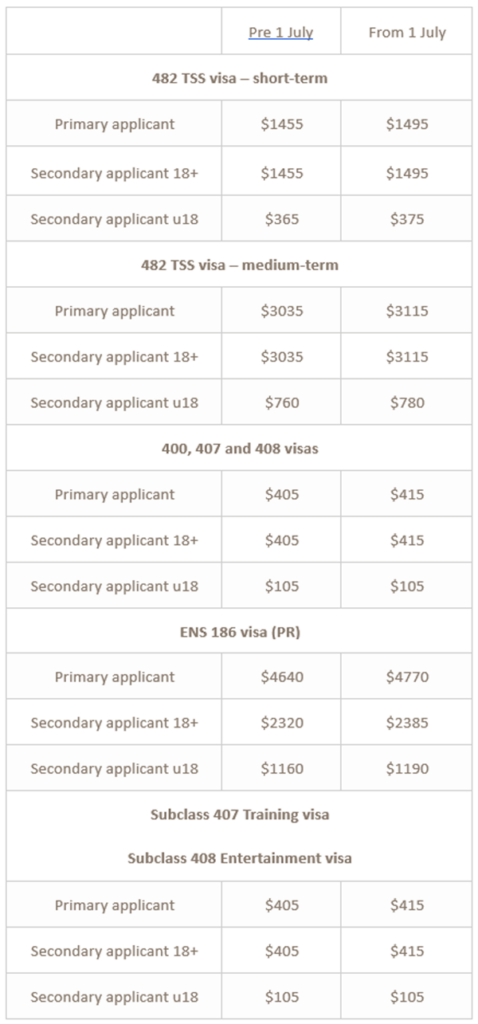Further to our newsletter earlier this week we have now received the new Regulations. However the policy around this has not yet been released.
Recap – what is changing
From 1 July 2024, TSS subclass 482 and Regional subclass 494 visa holders who cease employment with your business can stay in Australia and work for up to 180 days for any other employer in any occupation while they seek a new sponsor.
It also means you can employ TSS subclass 482 and Regional subclass 494 holders without having to transfer their sponsorship (nomination) before the commence work.
What has not changed?
All sponsorship obligations remain unchanged.
For employees ceasing employment, your business must still notify the cessation of employment of a sponsored worker within 28 days.
Your business is still obliged to pay the reasonable return travel costs of the sponsored workers and their family unless and until:
- They have been nominated by another sponsor or granted a new visa; or
- Have permanently left Australia and their work visa has been cancelled or expired.
Your business is still liable for up to $10,000 (less any travel costs paid) for the costs of locating and removing a sponsored worker or their family if they do not depart at the end of their visa. In practice we have never seen the Department enforce this provision.
Which visa holders does this apply to?
The changes apply to all TSS and 494 visa holders from 1 July 2024. It does not matter when their visa was granted.
What does it mean for your business?
- You will need to continue to manage your sponsored employees in the same way but can expect that requests for travel costs might be made well after the sponsored worker has left your business.
- You will have the opportunity to hire TSS visa holders who have left their sponsored employment for up to 180 days in any position without the need to sponsor them. The 180 days will start on 1 July for ALL 494 and TSS visa holders, including ones who ceased employment before that date. Any time that a visa holder ceased working for their sponsor prior to 1 July 2024 will not count towards the 180 days.
- Sponsored employees will be able to work in between sponsorships for a total of no more than 365 days in the period of their visa.
- You will need to put thorough processes and checks in place to manage TSS and 494 visa holders who you have not yet sponsored to ensure they do not work for more than 180 days since their last day of employment with their previous sponsor and to ensure that you do not employ a sponsored visa holder outside of their occupation for more than 365 days.
- You should plan for some additional costs around managing this as it will be more difficult for us to provide a strategy for such workers, and we will need to charge for this work.
Can we get a refund of the SAF levy if a sponsored employee leaves?
Refunds of the Skilled Australia Fund (Training Levy) will still be extremely limited until the regulations change (the government is proposing to change the refund provisions, but we do not know when).
What happens if your former employee does not find a new sponsor within 180 days?
If they have not applied for another visa or found a new sponsor after 180 days, they will need to depart Australia or face possible cancellation of their visa. The business obligations continue as above.
Will this impact the permanent residence pathways for employees?
This is complex and will need to be worked out case-by-case but it should not change the current rules in most cases.
Under the current rules:
Under the 2-year sponsored pathway, as a general rule, the TSS visa holder needs to work in the position for which they were nominated. This means that their time starts again when they change sponsoring employers because they start in a new position. There is no change to this rule.
Upcoming possible changes:
However, another possible change flagged (we don’t know when) will allow sponsored workers to count periods of work for multiple sponsors (in the same occupation) when calculating the two years of sponsored employment before they can transition to permanent residence. There are no details yet about how this will be applied in cases where the person has not been sponsored in between roles (for up to 180 days) or where they may have worked in another occupation during this time under the new 365 day rule.
Our advice
- Continue to notify within 28 days of cessations of employment following the same process.
- Ensure internal systems continue to track visa expiries.
- Update internal systems to track any new employees holding a 494 and TSS visa that your business has not nominated to ensure that they are not employed for more than 180 days (this would be an offence) and not employed outside of their occupation for more than 365 days. Unfortunately, the Department will not provide us with data of when that employee ceased employment and VEVO at this stage does not have this data. Merely checking VEVO is not sufficient at this stage.
- If employing a visa holder before lodging a nomination (transfer) application, seek employment law advice regarding the type of contract to be issued (ie fixed or permanent).
- Continue to do nomination transfers as before to attract talent, for critical employees, and to avoid disruption and complications with permanent eligibility. Nomination requirements still remain the same.
As always we are here to assist and you should contact your Ajuria advisor for more information.
The post Changes to TSS and Regional 494 visa – 1 July 2024 first appeared on Ajuria Lawyers – Leaders in Immigration.




